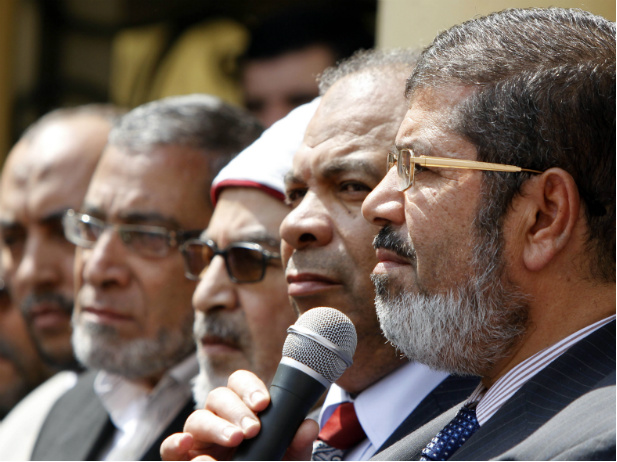
Last month, Time magazine put Mohamed Morsi on its cover, describing him as “The most important man in the Middle East.” In the accompanying interview, Morsi was asked, “Is the Muslim Brotherhood a democratic organization?” He responded, “According to the definition of democracy, I would say yes – emphatically, yes, without a doubt. Faith is the wellspring of democracy – faith in the Islamic sense.” However, in the ten years I spent in the organization I learned that this is not the case. In the half-secret organization I came to know from 2001 through 2011, the opinion of the leader, no matter his place in the hierarchy, outweighed the rules that had been set forth to regulate the organization’s work. Whether the members even knew of the rules was another matter altogether.
Morsi hardly ascended within the organization by way of democratic elections. He was appointed head of the Muslim Brotherhood’s parliamentary bloc in 2000, not elected by his 17 colleagues; he was appointed head of the Freedom and Justice Party in 2011, not elected by the party founders. In 2012, he was chosen as a presidential candidate without an election by the leadership core, most of whom preferred not to nominate anyone for the position at all. It isn’t known for certain how these choices were made, but I believe that the Supreme Guide’s small executive circle (composed of himself, his deputies, and the secretariat) made the decisions, and the organization simply followed in their footsteps.
Additionally, women do not have the right to vote in the Brotherhood’s internal elections, as if they don’t count them as members, although their service to the organization is almost equal to that of men. While this was palatable as a protective measure in the years of persecution prior to the revolution, it remains the case even after the Brotherhood has escaped that persecution, going on to win the presidency and a majority in the now-dissolved parliament. Their stance is in stark contrast with Egypt’s own history, with women granted the right to vote and run for office in general elections in the 1956 constitution. It is also worth noting that the Brotherhood puts women on its parliamentary election ballots because the law requires it, and indeed it relies on women’s strong turnout to secure victory.
In view of history and current events, then, it’s easy to understand how the opposition – and I am among them – sees Morsi’s recent actions as yet another step along the Brotherhood’s long-trodden path.
A president who was democratically elected in June 2012 and took an oath before the Constitutional Court as required by the SCAF’s constitutional declaration (showing a degree of conformity to the state) is the same president who prevented the judiciary from considering any lawsuits filed against his own acts and laws, whether in an administrative or constitutional court. He is the same president who appointed a prosecutor general with no input from the Supreme Judiciary Council. And he is the same president who guaranteed himself the right to take “measures” (which may include emergency law) to protect “the January 25 Revolution, the life of the nation, and national security” from danger. All this within five months.
It is hard to say exactly how far back the Brotherhood’s intent to manipulate democracy really goes. It does, however, appear that when it seemed to the Brotherhood that adhering to the fundamentals of democracy would impede them, they have opted for decisions that are crushing the nation’s institutions and its rule of law.
They’ve forgotten that ‘legitimacy’ is not a concept that can be so easily violated in a country with a heritage of constitutionality, a strong judiciary, an active media, a lively political sphere, and enlivened public opinion. The narrative of the ‘sultan’ and his private army who use religion to do as they please doesn’t work here, like it did in empires of old.
It is clear that the Salafis – those among them who see democracy as ‘heretical’ and won’t accept it unless hopelessly constrained – have a certain degree of influence on the ruling party’s choices. Although the Brotherhood and Salafis are far from identical, they share the same constituency, and the Brotherhood does not want to lose votes due to appearing less conservative than their Salafi counterparts. This is evident in Morsi’s slide to the right of his initial stances, such as retreating from his declared intent to appoint a female vice president and appointing instead a female ‘aide.’ We see the same rightward move in several places in the constitution as well, such as the addition of article 220 that defines the “principles of Islamic law” in such a way that troubled the Coptic Church.
The liberal and leftist opposition, however, including the revolutionary blocs that have flocked leaderless to the streets in times of crisis, are re-entering the political equation. They have successfully mobilized large numbers of people in every governorate in the past two week, their protests reaching even the presidential palace itself. The Brotherhood did not take this into account or expect such a show of strength. It shows that the country has not completely given way to Morsi and that he cannot lead it where ever he wills. The crowds have shown that there is a modern progressive alternative, one that requires Morsi to take a few steps to the left.
Regardless of how the mounting clashes in Egypt end, the country’s democratic future, or at the very least, its stability, will be achieved by developing civil political parties, and fostering the popularity of their political figures among the general public. It also depends on encouraging the Brotherhood to engage in a national dialogue, one which recognizes the weight of the opposition, and ends in a fair agreement that guarantees the interests of all parties involved.
Photo Credit: Reuters
Image: Morsi%20Reuters.jpg
